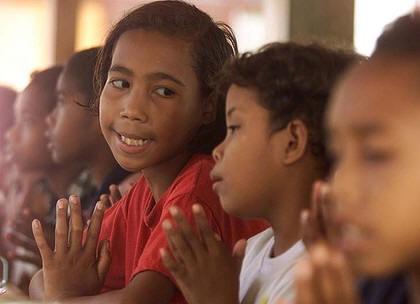
In this 2001 photo, Madalena Soares holds a photo of her 12-year-old daughter, Cesaltina, taken from her during the 1999 conflict and placed in a Java orphanage. Photo: Jason South

They were East Timor's stolen generation. Between 1975 and 1999 about 4000 young and vulnerable Timorese were secretly taken to Indonesia where some of them were forced to work in slave-like conditions while others were educated and grew up with the families of soldiers.
Until now little was known of the fate of the children, some of whom were abducted and others whose parents were coerced or deceived into giving them away. Following research in Indonesia and East Timor an Australian academic, Helene van Klinken, has published the first detailed account of the practice she says was an example of ''hegemonic power using children in its goal of dominating the subordinate group to which the children belong''.
''Those who took children acted out of mixed and varied motivations, ranging from genuine compassion and good intentions to the less benevolent manipulation and use of vulnerable children for economic, political and ideological ends,'' Dr Van Klinken says. While white Australian officials removed Aboriginal children from their families last century to educate them, the Indonesians removed many Timorese children because they did not have children of their own or to work for their families.

Power of prayer … East Timorese refugee children in an orphanage near Yogyakarta, Central Java, in 2001. Photo: AP
''They also wanted to adopt the children of the resistance as a way to punish, weaken and humiliate the enemy,'' Dr Van Klinken says in a new book, Making them Indonesians, published by Monash University Publishing.
''The children were there for them to take like other spoils of war, and bringing home a child became for some proof of their success in dominating the East Timorese.''
Dozens of children were taken from Timorese refugee camps in 1999 and put in Indonesian institutions partly because those responsible knew the children would help them attract donors. Another motivation was to educate the children to struggle for the future reintegration of East Timor, whose people voted for independence in 1999.
''But most did not become collaborators in the East Timor integration project as the Indonesians had hoped,'' she says. ''Their experiences and those of their parents and families living under abusive, Indonesian military rule led most of them to reject integration.''
Many of the children from Catholic families were raised as Muslims in Indonesia. ''The East Timorese were expected to return home and spread Islamic faith among indigenous East Timorese,'' Dr Van Klinken says.
Many children had difficulty studying in Indonesia because of the trauma they had experienced and many suffered from the side-effects of malnutrition. But some did succeed.
The adopted son of Indonesian Major-General Kiki Syahnakri became a senior public servant. Timorese adoptee Toni Taulo became a TV actor, Sebastian da Costa became a well-known tennis player and Thomas Americo was the first boxer in Indonesia to compete against an international title holder.
Dr Van Klinken says that up to 10 Timorese youths lived at the house of Major-General Zacky Anwar Makarim, a special forces intelligence officer who oversaw the organisation of pro-integration militia in East Timor in 1999, where they cleaned, did the gardening and guard duty but were not sent to school.
One of them, Hercules Rozario Marcal, became a notorious gang leader in Jakarta. And Alfredo Reinado, who wept as he was forcibly removed from his mother in East Timor in 1978, became a renegade military officer who was shot dead at the home of East Timor's President Jose Ramos-Horta in 2008.
In a foreword to the book, Kirsty Sword-Gusmao, wife of East Timor's Prime Minister, Xanana Gusmao, says there are many Timorese families who still ''long to meet their missing children'' in Indonesia.
She hopes that Timorese taken to Indonesia when they were children realise they are not alone in their experience.
''I hope they will search for their families and those who took the children to Indonesia will assist them in their search,'' she says.